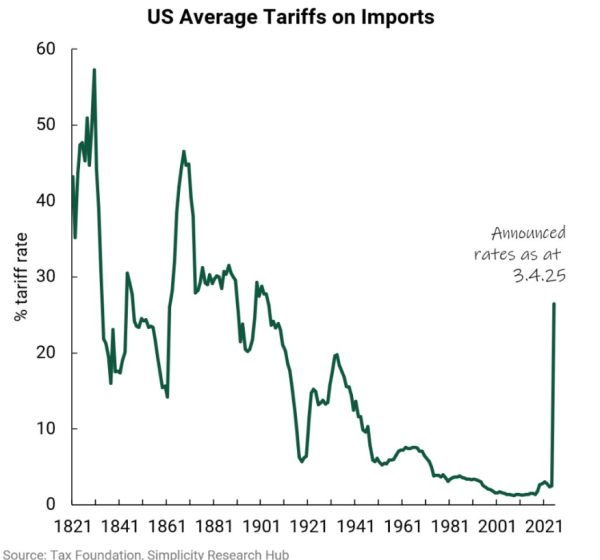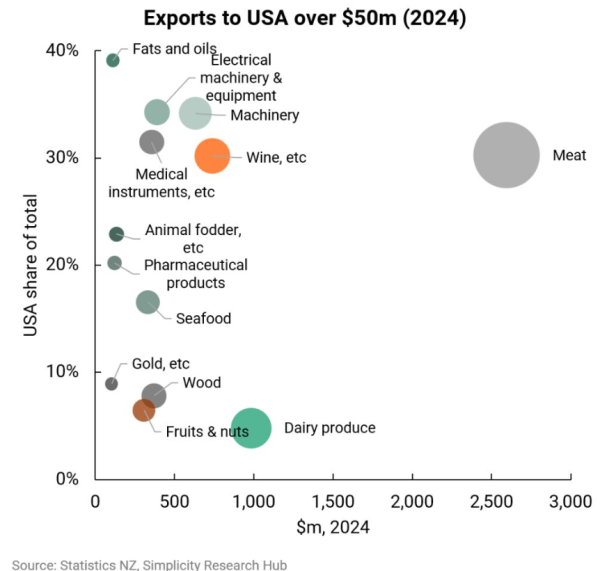Learn » Simplicity Research Hub » Liberation Day - What the latest US tariffs mean for NZ
Liberation Day - What the latest US tariffs mean for NZ
Published on 03/04/2025

By Shamubeel Eaqub, Chief Economist - Simplicity Research Hub
USA ‘Liberation Day’ tariffs have been announced. Which may or may not be changed or reversed as negotiating chips. Back-of-the-envelope, this adds up to a 26.5% increase in US import costs (see chart 1 below). It would be the highest since the early 1900s.
The headlines:
-
10% on all imports (including NZ)
-
An additional 34% tariff on China (apparently on top of an existing 20%)
-
20% on Europe, and so on. It’s a long list.

Figure 1: The average tariffs imposed on imports by the US since 1821
If implemented fully, it will lead to a significant increase in prices and reduce spending in the US. Which will affect demand for exports, and the knock on effect from other increase the costs for business (inputs) and consumers (imported finished goods).
The impact on NZ is in 3 key ways:
- Direct - affecting highly exposed exports (like meat, wine and medical instruments).
- Indirect - countries we trade with - such as China and Europe - get hit economically, and we get hit in turn (second hand effects if you will)
- Financial markets - equity markets are volatile, as they try to digest this news. The general view is that it will be bad for the economy, and thus markets.
The second chart shows NZ’s major export segments that are highly exposed to the US - meaning they are both large in revenue (over $50m in 2024) and have significant US exposure.
Four that are easy to grasp:
Meat: $2.6b (30% to USA)
Wine $0.7b (30%)
Medical instruments: $0.3b (32%)
Pharmaceuticals: $0.1b (20%)

Figure 2: NZ’s major export segments that are over $50M and highly exposed to the US
Tariffs will increase the price of US imports - quite a lot - and reduce spending (although not immediately, as price impacts take time to flow through).
What can we do?
Some ideas:
- Our trade negotiators and political leaders will need to engage with their American counterparts to see what’s possible. Perhaps more importantly, we need to increase dialogue with other like-minded countries to create broader economic partnerships with fewer barriers.
- Exporters will need to think carefully about how much price reduction they can absorb to maintain market share in the US. But that may be a short-term strategy. Longer-term, businesses need to think about how to export in a fundamentally changed world and which new markets we could consider. Easier might be to focus on what we can do here in New Zealand and our own businesses to reduce costs and increase resilience - all businesses will need to do this
- For people like you and me, it can feel paralysing to see so much uncertain and negative news all in one go. Especially when KiwiSaver balances are also being hit. But we do not have much control over these global events or market movements. What we can control is our investment strategy. For retirement savings, its really important to make sure you are in the right kind of fund for your personal situation. And the old adage applies even in these times: time in the market matters more than timing the market. Historically, there have been more good years than bad.
Keep calm, keep contributing, and look out for each other. When the world feels crazy, the best comforts are in our family, friends and community.